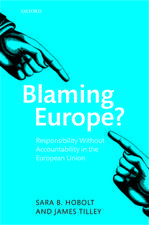The Field of Eurocracy: Mapping EU Actors and Professionals: European Administrative Governance
Editat de D. Georgakakis, J. Rowellen Limba Engleză Hardback – 26 noi 2013
| Toate formatele și edițiile | Preț | Express |
|---|---|---|
| Paperback (1) | 384.86 lei 6-8 săpt. | |
| Palgrave Macmillan UK – 2013 | 384.86 lei 6-8 săpt. | |
| Hardback (1) | 388.72 lei 6-8 săpt. | |
| Palgrave Macmillan UK – 26 noi 2013 | 388.72 lei 6-8 săpt. |
Din seria European Administrative Governance
- 17%
 Preț: 460.49 lei
Preț: 460.49 lei -
 Preț: 380.07 lei
Preț: 380.07 lei -
 Preț: 385.84 lei
Preț: 385.84 lei -
 Preț: 390.63 lei
Preț: 390.63 lei -
 Preț: 385.47 lei
Preț: 385.47 lei -
 Preț: 388.52 lei
Preț: 388.52 lei - 18%
 Preț: 1234.14 lei
Preț: 1234.14 lei - 15%
 Preț: 641.53 lei
Preț: 641.53 lei -
 Preț: 388.52 lei
Preț: 388.52 lei -
 Preț: 381.59 lei
Preț: 381.59 lei -
 Preț: 386.00 lei
Preț: 386.00 lei -
 Preț: 386.39 lei
Preț: 386.39 lei - 18%
 Preț: 722.58 lei
Preț: 722.58 lei - 15%
 Preț: 695.34 lei
Preț: 695.34 lei - 18%
 Preț: 1112.48 lei
Preț: 1112.48 lei - 18%
 Preț: 887.83 lei
Preț: 887.83 lei - 15%
 Preț: 703.20 lei
Preț: 703.20 lei - 15%
 Preț: 530.75 lei
Preț: 530.75 lei - 18%
 Preț: 781.00 lei
Preț: 781.00 lei - 15%
 Preț: 522.42 lei
Preț: 522.42 lei - 15%
 Preț: 496.48 lei
Preț: 496.48 lei - 15%
 Preț: 694.22 lei
Preț: 694.22 lei - 18%
 Preț: 786.98 lei
Preț: 786.98 lei - 18%
 Preț: 729.53 lei
Preț: 729.53 lei
Preț: 388.72 lei
Nou
Puncte Express: 583
Preț estimativ în valută:
74.38€ • 78.08$ • 61.74£
74.38€ • 78.08$ • 61.74£
Carte tipărită la comandă
Livrare economică 10-24 aprilie
Preluare comenzi: 021 569.72.76
Specificații
ISBN-13: 9781137294692
ISBN-10: 1137294698
Pagini: 274
Ilustrații: XIV, 288 p.
Dimensiuni: 140 x 216 x 15 mm
Greutate: 0.43 kg
Ediția:2013
Editura: Palgrave Macmillan UK
Colecția Palgrave Macmillan
Seria European Administrative Governance
Locul publicării:London, United Kingdom
ISBN-10: 1137294698
Pagini: 274
Ilustrații: XIV, 288 p.
Dimensiuni: 140 x 216 x 15 mm
Greutate: 0.43 kg
Ediția:2013
Editura: Palgrave Macmillan UK
Colecția Palgrave Macmillan
Seria European Administrative Governance
Locul publicării:London, United Kingdom
Cuprins
Introduction: Studying Eurocracy as a Bureaucratic Field; Didier Georgakakis, Jay Rowell 1. MEPs: Towards a Specialization of European Political Work?; Willy Beauvallet and Sebastien Michon 2. Tensions Within Eurocracy: A Socio-Morphological Perspective; Didier Georgakakis 3. The Permanent Representatives to the EU: Going Native in the European Field?; Filippa Chatzistavrou 4. ECB Leaders: a New European Monetary Elite?; Frederic Lebaron 5. The World of European Information: The Institutional and Relational Genesis of the EU Public Sphere; Philippe Aldrin 6. Expert Groups in the Field of Eurocracy; Cecile Robert 7. Interest Groups and Lobbyists in the European Political Space: The Permanent Eurocrats; Guillaume Courty, Helene Michel 8. The Personnel of the European Trade Union Confederation: Specifically European Types of Capital?; Anne-Catherine Wagner 9. European Business Leaders: A Focus on the Upper Layers of the European Field Power; Francois-Xavier Dudouet, Eric Gremont, Audrey Pageaut, Antoine Vion Conclusion: The Field of Eurocracy: A New Map for New Research Horizons; Didier Georgakakis
Recenzii
'Didier Georgakakis and Jay Rowell have put together a thought-provoking volume on 'the field of Eurocracy'. Contributors provide a wealth of information on the EU's actors while introducing a new sociological, actor-centred perspective which provides a welcome supplement (or even antidote) to more conventional studies of the European institutions.'
- Michelle Cini, Professor of European Politics, University of Bristol, UK and Co-editor, Journal of Common Market Studies
'The institutions of the European Union, despite valiant efforts to increase their transparency, remain puzzling to specialists and citizens alike, encouraging reductionisms such as that of a tentacular and all-powerful 'Brussels bureaucracy.' There are bureaucrats in Brussels, they are divided, functionally dispersed and, while very competent, much less powerful than such myths make them out to be. This excellent volume helps greatly to map 'Eurocracy' and demolish these myths. At a moment when the project for building a new Europe is under siege, such contributions are essential.'
- George Ross, ad personam Chaire Jean Monnet, Université de Montréal, Canada; Emeritus, Brandeis University, USA and Faculty Associate, Minda de Gunzburg Center for European Studies, Harvard University, USA
'Forty-five years after A. Spinelli's 'The Eurocrats', this is the first book to systematically deploy the concepts, analytical tools and methodology of contemporary sociology to thestudy of the European Union institutions. An entirely original perspectives on the institutions and the people who work for them thus emerges. Specialists of European affaires, scholars and students in politics, administration and sociology as well as citizens will develop a new understanding of who rules the EU institutions and why, sociologically speaking, the European project appears to be in crisis.'
Juan Díez Medrano, Professor of Sociology, Universidad de Barcelona, Spain and Chair of the Council for European Studies
- Michelle Cini, Professor of European Politics, University of Bristol, UK and Co-editor, Journal of Common Market Studies
'The institutions of the European Union, despite valiant efforts to increase their transparency, remain puzzling to specialists and citizens alike, encouraging reductionisms such as that of a tentacular and all-powerful 'Brussels bureaucracy.' There are bureaucrats in Brussels, they are divided, functionally dispersed and, while very competent, much less powerful than such myths make them out to be. This excellent volume helps greatly to map 'Eurocracy' and demolish these myths. At a moment when the project for building a new Europe is under siege, such contributions are essential.'
- George Ross, ad personam Chaire Jean Monnet, Université de Montréal, Canada; Emeritus, Brandeis University, USA and Faculty Associate, Minda de Gunzburg Center for European Studies, Harvard University, USA
'Forty-five years after A. Spinelli's 'The Eurocrats', this is the first book to systematically deploy the concepts, analytical tools and methodology of contemporary sociology to thestudy of the European Union institutions. An entirely original perspectives on the institutions and the people who work for them thus emerges. Specialists of European affaires, scholars and students in politics, administration and sociology as well as citizens will develop a new understanding of who rules the EU institutions and why, sociologically speaking, the European project appears to be in crisis.'
Juan Díez Medrano, Professor of Sociology, Universidad de Barcelona, Spain and Chair of the Council for European Studies
Notă biografică
Philippe Aldrin, Sciences Po Aix, FranceWilly Beauvallet, University of Strasbourg, FranceFilippa Chatzistavrou, ELIAMEP foundation, Athens, GreeceGuillaume Courty, Sciences Po Lille, FranceFrançois-Xavier Dudouet, University of Paris-Dauphine, FranceEric Grémont, Observatory of Capitalist structures (OpesC)Frederic Lebaron, University of Picardie, FranceSébastien Michon, University of Strasbourg, FranceHélénè Michel, University of Strasbourg, FranceAudrey Pageaut, University of Strasbourg, FranceCécile Robert, Sciences Po Lyon, FranceAntoine Vion, University of Aix-Marseille, FranceAnne-Catherine, University of Paris I Sorbonne, France














